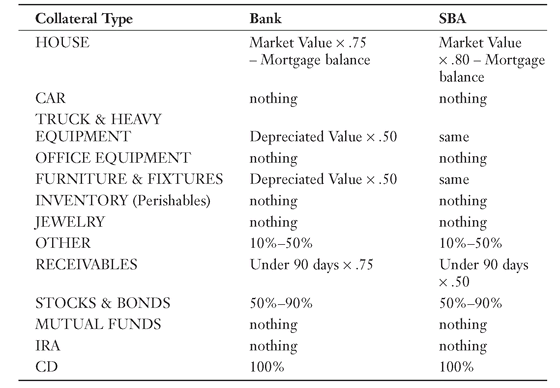Chapter 22
Make a Plan, Check It Twice
In This Chapter
• Are you ready to take the next step?
• Writing a business plan helps you focus
• Financial resources for your company
• The absolute essential you can’t afford to cut
After a few years in the business, you may decide, as I did, to open your own mortgage broker company. I’d worked as a broker for six years before buying my company, Financial Access Corporation. What’s the secret to an easy transition from employee to owner? Increasing my responsibilities in the office as I continued working with my clients. So over time, I formulated the company’s marketing plan, expanded the referral network of realtors, developed the corporate operating budget, established new lender relationships, and finally, took responsibility for all the bookkeeping and payroll. By the time I signed the papers that officially transformed me into owner, I had a fair amount of experience of running a company under my belt.
In this chapter, we’re going to look at what steps you need to take if you’ve decided that you want to add “owner” after your name. If you have the opportunity to get some on-the-job training in your current office, so much the better. If not, you’ll find here a broad outline of how to develop a compelling business plan that will convince lenders they should help finance your company. We’ll talk about some of the essentials that you need to consider before you open your doors for business.
Do You Have What It Takes to Be an Owner?
Working on commission is good training for being an owner. You already know what it’s like to be dependent on your own efforts for your earnings. There are no salary guarantees for a company owner—just like there are no guarantees for a mortgage broker. Taking a calculated risk doesn’t scare you. If you wanted safe and predictable, then you wouldn’t have gone into this career. And that willingness to trust your ability to make it work is one of the important characteristics of successful business owners.
Answer these questions and see if you’ve got the goods to be a company owner:
1. Are you self-motivated?
Do you need to someone else to develop projects, organize your time, follow up on details? Or can you be counted on to work hard without someone hounding you to produce?
2. Are you a people person?
Sure you have to be comfortable connecting with strangers in order to be successful as a mortgage broker, but this is more. You will need to be able to accommodate the different personalities who will be working with you, as well as the vendors who make your company work. Can you put aside your ego to work with a temperamental employee who’s a huge rainmaker for your company?
3. Can you make decisions?
Yes, everyone has to make decisions, but this is more than that. Do you dither over minor issues, or can you make fast, smart decisions under pressure—and then move on? To quote Harry Truman, “the buck stops here.” You’re the one who has the ultimate say-so. Are you comfortable with that responsibility?
4. Do you have the stamina to run a business?
This is hard work, emotionally and physically. Certainly in the beginning, the hours are long, and the financial payoff may be down the road. Being the company owner means hanging tough when the going gets rough.
5. Are you well organized? Do you plan ahead?
The devil is in the details—and many of them are small, but critical. You’ve got to be well organized—or hire someone who is—to handle all the mechanics of running a business—payroll, personnel, schedules, computer systems, the list is endless.
6. Are you burned out before you begin?
You’ve got to want to do this. You can’t be wishy-washy about whether or not you want to own a business. There are too many demands and too much money involved to do this half-heartedly. You need drive and ambition to succeed.
7. What’s the personal toll if you open your own business?
The first few years of a new business are especially demanding. You’re on call 24/7, and every day away from the business is a deal that may be lost. In Chapter 25, we’ll talk about finding a balance in your life. But you have to consider the toll on your family life if you decide you want to start your own company. The personal effect of being away from the family may be too hard. And financially, in the beginning, you may make less money than you did as an employee. You will need to plow much of your profits back into the business and you may find yourself unable to take on as many clients because of the demands of running the company.

Did You Know?
Check out the Small Business Administration, www.sba.gov. It’s an excellent resource, offering advice and programs for new start-ups.
If after answering these questions and carefully considering the implications you’re still interested in opening your own business, the sections that follow describe what you need to do.
It Starts with a Plan
You need a business plan. It will help you focus your energies on the nitty-gritty details of creating a business, as well as give you a broad perspective of your short-and long-term goals. This same information can be used for a loan proposal when you approach lenders for funding.
While you may be someone who can keep a running list in your head, mentally checking off each item, that’s not enough for this purpose. You need to do thorough research and then compile the information into a printed report.
There are five parts to a business plan, but each section has multiple questions that you need to answer. Expect to take several months getting the data you’ll need. While you may veer somewhat from what you propose, the numbers and rationale need to make sense to a lender.
The sections are:
• Introduction
• Marketing
• Financial management
• Operations
• Concluding statement
Introduction
In this section, you begin the most important sales job you’ll have. You will make the case for yourself as an entrepreneur, and the need for another mortgage broker firm in your community. There are other firms, both local and national franchises. You have to explain why your mortgage firm will be different—and more importantly, why it will succeed.
• Give a detailed description of the business and its goals. Will it be a full-service company or focus on a niche, like co-op apartments?
• Explain who will own the business and its legal structure. Is it going to be a sole proprietorship or will you have a partner? You will need to talk to a lawyer about the state regulations of corporations, as well as to an accountant about the tax implications of various organizational structures. You’ll need an accountant to help you set up the payroll structure of your business, as well as prepare your company’s tax returns.
• List the skills and experience you bring to the business.
• Make clear the advantages your company has over its competition.
Marketing
You need to make a convincing case that you can reach the clients, realtors, builders, and contractors, who will support your mortgage broker business.
• Identify the customer demand for your company. How many homes sold in your area; the average mortgage; the growth in the community.
• Cite national housing statistics, as well as the increasing use of mortgage brokers as loan originators (65 percent of all home loans are originated by mortgage brokers).
• Identify your market, its size, and location.
• Explain how you will market your company: print, radio, television, Internet, mailings, via realtors, contractors, builders.
• Explain your pricing strategy. Will you waive certain fees or offer additional services, like will you have an insurance company or appraisal unit as part of your one-stop shopping experience?
Financial Management
You’re going to have to crunch some numbers. These can’t be estimates. You need to develop a detailed monthly operating budget for the first year. That means researching how much you’ll spend for rent, taxes, salaries, office materials, marketing, and so on.
• Explain your source of funding. Will you be seeking a commercial loan? How much of your own resources are you putting into the business? Is anyone else putting in money, and what is the plan to repay their initial investment?
• Develop an expected return on investment and monthly cash flow plan for a full year.
• Provide projected income statements and balance sheets for a two-year period.
• Explain your break-even point.
• Describe your own balance sheet and method of compensation. What will you live on during this period? If you project your income will be significantly reduced from previous years, explain how you will make up the difference.
• Explain who will maintain your accounting records. While previously you may have completed your own income tax forms, if you are starting a company, you should hire an accountant and a tax professional.
• Explain how you will handle any potential problems that might arise in the first year. For example, emergency repairs or replacement of office equipment, delays in settlements that could produce cash flow crises.
Operations
You will need to describe the specifics of the company operations.
• Explain the day-to-day management of the business: who will run the office, handle payroll, hire employees, and so on
• Discuss hiring and personnel procedures
• Review insurance, lease, and rental agreements
• Detail the office equipment you will buy or lease
Concluding Statement
Like the term papers you did in school, you now need to sum up your case.
• Outline your business goals and objectives. Be specific about how many deals you anticipate concluding in the first year and why you believe it’s a realistic number. For example: I will do $35 million of loans in the first year of business. I have a contract with the builder of the new 60-home development now under construction in Smithtown to serve as the mortgage broker for the project. I anticipate revenues of $14 million from this project in the first year with the opening of two divisions. This is in addition to the steady stream of clients I already have, built on my network of contacts with local realtors, contractors, and builders.
• State plainly and clearly your determination to make the company a success.
Once you have completed your business plan, review it with owners of other established businesses for their input and advice. Or you can contact a counselor at the Service Corps of Retired Executives, www.score.org, or the Small Business Development Center for your state.
Financing Your Business
You need money to start a business. Even if you are confident that you will immediately have a steady stream of clients, it generally takes three months from application to closing and commissions aren’t paid until the closing. There are a multitude of up-front costs. You’ll need to lease space, furnish it, buy office equipment, pay legal and accounting fees, licenses fees, employee benefits (including your own), and much more.
You may be able to tap your own equity for start-up costs, but it’s unlikely to be enough. You could also approach family and friends for loans, possibly offering a small stake in the company as collateral. Once you have developed a budget and projected your expenses and income over a year, it will be clear exactly how much you’ll need.

Did You Know?
The SBA has a loan prequalification program to have loan applications for $250,000 or less analyzed and potentially sanctioned by the SBA before you take it to a lender for consideration. See the SBA website, www.sba.gov/financing/frprequal.html.
The Small Business Administration offers several loan programs to assist small businesses. In most cases, the SBA is primarily a guarantor of loans made by private banks and other institutions. You may be eligible for a Basic 7(a) Loan Guaranty, which is the SBA’s primary business loan program to help qualified small businesses obtain financing when they might not be eligible for business loans through normal lending channels. Loan proceeds can be used for working capital, furniture, and fixtures, and the loan maturity is up to 10 years for working capital. It’s delivered through commercial lending institutions. Check the Small Business Administration website, www.sba.gov/financing/fr7aloan.html.
Most small business owners borrow start-up money from a commercial bank, but it’s a hard sell and you’ll need to be prepared. You’ll use your business plan as the basis for your loan proposal. Since there are different formats for loan proposals, contact the lender to see what they use.

Heads Up!
Don’t assume that the lender understands the mortgage broker industry. Include industry-specific details and trends in your loan proposal.
In addition to the information in the business plan, you’ll also need to provide …
• the resumé of each owner (if you have a partner).

def·i·ni·tion
A guarantor is a person who makes a legally binding promise to pay another person’s debt if that person defaults.

Heads Up!
Lenders require at least two sources of repayment. The first is cash flow from company profits; the second is the collateral used to pledge the loan.• personal financial statements of each owner and any guarantors (someone who guarantees to repay the loan in the event that you default). The financial statement (s) cannot be more than 90 days old and should include the most recent tax return(s).
• projections of future operations of the business. These should be for at least one year or until positive cash flow can be shown. Include your rationale for expenses and earnings. The projections should be in a profit and loss format. This section is critical to your loan approval. You must be able to support your projected figures with clear, documentable explanations.
• copies of your lease for office space (or proposed space), purchase agreement (if you are buying an established mortgage broker company), articles of incorporation, copies of licenses, letters of reference, contracts, and partnership agreement.
• a list of the real property and other assets to be held as collateral for the loan.
Will the Lender Say Yes?
Lenders typically consider the 5 Cs of credit when making a small business loan. Each element is important but may not have equal weight when the lender is making the final decision on your particular loan. For example, if the economy is in a downturn and the housing market has slowed significantly, they may be less interested in a loan to start a mortgage broker company, even if you have a stellar credit rating and proven record of success as a broker. The 5 Cs are:
• Capacity: your ability to repay the loan is probably the most critical element. Your existing credit history of repayment of loans will be used as a predictor of future payment performance. Lenders also want to know about your contingency plans for repayment in the event that the business doesn’t generate enough cash.
• Capital: the money you personally plan to invest in the business. Lenders expect you to invest your own money and assets in the business, to assume a personal financial risk to establish the business. They believe that a borrower with a financial stake in the business will work harder to make it succeed.
• Collateral: this can be in the form of personal assets, but another alternative is to get someone to serve as a guarantor of the loan.
• Conditions: what will you use the money for? Is it working capital or for additional equipment? Conditions also refers to the local and national economic conditions that could affect your mortgage broker company.
• Character: this is all about you. The lender will judge whether you have proven, through your credit history, letters of reference, education, and business experience, that you are a good risk and will repay the loan.

Heads Up!
Lenders want to see that you are investing your money into the business, as well as theirs. There are no 100 percent loans to start a company. Most lenders want the total liabilities or debt of a business to be not more than 4 times the amount of equity. For example, if you have concluded that you need $100,000 to start your new mortgage broker company, most lenders will expect you to put in $20,000 as equity. The loan will be for $80,000. The debt to equity ratio is 4:1.
If the Bank Says No
If the bank says yes, then congratulations! But if the lender turns you down, don’t take it personally. You can approach another lender with your proposal. But do take the time to ask the lender the reasoning behind the decision. It may help you strengthen your proposal for the next lender—or rethink your strategy for the business.

Heads Up!
Check the licensing requirements for your state (see Appendix B). As the owner of a mortgage broker company, you may be required to put your fingerprints on file. Your local police department may offer that service or check in the Yellow Pages under “fingerprinting.” You may also be required to post a surety bond. It’s an insurance policy that guarantees that you will perform the contract as mortgage broker in accordance with its terms. Check with your insurance agent.
Understanding Collateral
Your assets carry different values when used as collateral to secure a loan. The following table shows how lenders and the Small Business Administration value the collateral you pledge for a loan.

The bank will calculate your collateral coverage ratio as part of the loan evaluation process. This is calculated as follows: total discounted collateral value/total loan request.
Should You Buy an Existing Mortgage Broker Company?
I bought the mortgage broker company where I’d worked for six years. It had been a family business, so obviously that made some difference. But a strong argument can be made that buying an existing company makes a lot of sense, especially if it’s one that has a good reputation in the community.
The following are advantages of buying a business:
• drastic reduction in start-up costs
• big savings in the time and energy necessary to build a company from scratch
• pre-existing goodwill of customers, lenders, vendors, and network of contacts
• easier financing if company has good track record
The following are disadvantages of buying a business:
• initial cost may be high since owner is selling not only the business but the corporate reputation as well
• possible hidden problems with the business—insist on a full disclosure of all accounting
You’ll need to compare the costs in terms of time, energy, and money, to see if you want to start from the beginning or buy an existing mortgage broker company. If you decide to start your own firm, can the area support yet another mortgage broker company?

Heads Up!
Nearly half of all new small to medium businesses fail each year, according to Helen Chan, senior analyst, small and medium business strategies, at Yankee Group. The high failure rate is due primarily to: lack of experience, insufficient capital, and competition. With proper planning and effort on your part, you can beat the odds.
Insurance Just in Case
When you were considering your first mortgage broker job, we talked about the need for health insurance. I said that if it wasn’t being offered, it might be the deal breaker (unless you get coverage from another source). Especially when you’re first starting out, paying the total costs for your own health insurance can be a huge chunk out of your limited income.
Now that you’re starting your own business, you can’t afford to let your coverage lapse. But you also have to have other insurance policies for yourself and your business.
• Liability: for you and your employees. Talk to an insurance professional about how much coverage you need.
• Property: talk to your insurance agent to determine how much coverage you need to insure for the continuation of your business and the amount you would need to replace it. Be sure to discuss the limitations and waivers.
• Business Interruption (also known as Business Income): property insurance may cover damaged equipment; this policy can provide funds to pay your fixed expenses during the time your business is not operational.
• “Key Man”: this policy is used to provide continuity in operations during a period of ownership transition caused by the death or incapacitation of the “key man”—you.
• Automobile: if the company buys a company car, you will need to carry insurance for liability and replacement purposes. But if you use your own personal vehicle for company business, you also need “non-owned automobile coverage,” which protects the business from liability for any damage which may result from such usage.
• Home Office: if you’re establishing an office in your home, talk to your insurance agent to update your coverage to include office equipment. It’s not automatically included in a standard homeowner’s policy.
The Least You Need to Know
• Many of the characteristics that make you a successful mortgage broker will also make you a successful small business owner.
• Take the time to research and formulate your business plan.
• Most lenders demand a debt/equity ratio of 4:1 before they approve a small business loan.
• When planning to open your own company, you’ll need a good lawyer, accountant, and insurance agent.
..................Content has been hidden....................
You can't read the all page of ebook, please click here login for view all page.
